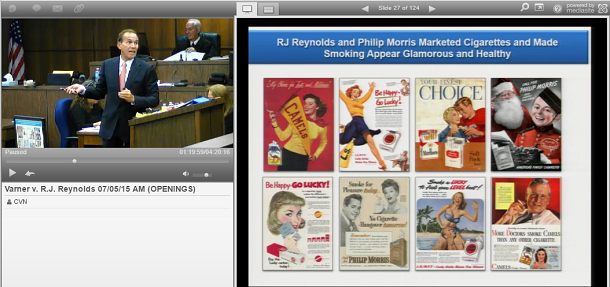
Scott Schlesinger tells jurors tobacco industry marketing was designed to hide the dangers of smoking and led to Virginia Varner's icotine addiction and death. Varner's husband Joseph is suing R.J. Reynolds and Philip Morris, makers of the cigarettes his wife smoked.
Fort Lauderdale, FL—Attorneys battled over whether tobacco industry deception or a smoker’s own decisions caused her fatal lung cancer, as trial opened against R.J. Reynolds and Philip Morris Tuesday. Varner v. R.J. Reynolds.
Virginia Varner began smoking at about 12 and continued smoking at least a pack a day for more than 40 years, until her 1994 lung cancer diagnosis. Although she allegedly tried to quit after the diagnosis, she wasn’t successful. Varner, 54, died of the disease in 1995.
Varner’s husband, Joseph Varner, claims a tobacco industry scheme to hide the dangers and addictiveness of smoking for decades led his wife to begin smoking as a child, rendered her hopelessly addicted to cigarettes, then caused her fatal cancer.
During Tuesday's opening statements, Schlesinger Law Offices P.A.’s Scott Schlesinger said evidence would show Philip Morris and Reynolds participated in a decades-long conspiracy to conceal the dangers and addictiveness of cigarettes, while targeting children like Virginia Varner as customers. “Twelve-year-old Virginia Varner did not make a life-long, lifestyle choice to be an addicted smoker,” Schlesinger said. “Nobody chooses addiction.”
However, the defense argues Varner enjoyed smoking despite knowing its risks, and she never made a serious attempt to quit until after her 1994 cancer diagnosis. During Tuesday's openings, Shook Hardy’s William Geraghty, representing Philip Morris, walked jurors through decades of media reports and warnings about the dangers of smoking. Geraghty said Varner refused her husband's 1992 plea to quit smoking, despite knowing cigarettes caused her mother’s emphysema and Joseph’s own heart attack. “She told [Joseph], ‘I am going to die anyway,’” Geraghty said. “And that, ladies and gentleman tells you everything you need to know about Mr. and Mrs. Varner’s attitudes about cigarette smoking,” Geraghty added. “Virginia Varner had no interest in quitting until the very end.”
The case is one of one of thousands of similar Florida lawsuits against the nation's tobacco companies. They stem from Engle v. Liggett Group, a 1994 class action claim involving Florida smokers. A jury in that case found tobacco companies knowingly produced dangerous, addictive cigarettes and hid those dangers from the public. The Florida Supreme Court decertified the class on appeal, but its decision allows individual plaintiffs to rely on the jury’s conclusions in the original trial if they can prove the smokers at the center of their cases suffered from nicotine addiction that caused a smoking-related disease.
Trial in the case is expected to last through the end of next week.
Neither the parties’ attorneys nor tobacco company representatives could be reached for comment.
Email Arlin Crisco at acrisco@cvn.com.
Related Information
Schlesinger Law Offices, P.A.’s Scott Schlesinger, Jonathan Gdanski, Steven Hammer, and Brittany Chambers represent Joseph Varner.
King & Spalding’s Jason Keehfus and Rebecca Ojeda represent R.J. Reynolds.
Shook Hardy’s William Geraghty represents Philip Morris.
Watch the trial live and on demand.
Learn more about CVN's unrivaled tobacco litigation library.





